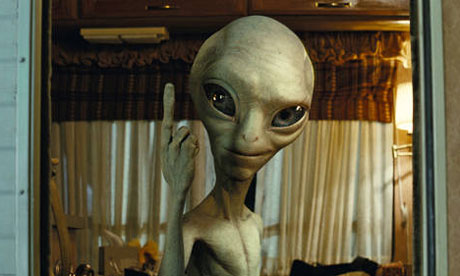
The Paul in Paul is a little green man. As an archetypal extraterrestrial, he would be, wouldn't he? But where did we get the idea that beings from outer space would most likely be dwarfish, verdant hominids?
Paul himself offers an explanation. He claims his race deliberately drenched our culture with images of themselves to ensure that when they eventually made contact, we wouldn't have "a spaz attack". On the face of it, this makes sense. Our comics, pulp books and screen fare were indeed awash with small, green, humanoid aliens from the 1890s until relatively recently.
All the same, only a fool would take at face value the word of an extraterrestrial, especially one fashioned by CGI. Paul fancies himself as a bit of a wag, and he may just be joking. Or he could be trying to impress us by exaggerating the capabilities of his own tribe's spin doctors.
Nonetheless, it has to be acknowledged that perhaps the best documented of all known alien visitations did indeed feature three-foot-high, thin-limbed humanoids. The "goblins" of the Kelly/Hopkinsville encounter in 1955 were described as looking metallic, rather than pastel-hued; perhaps, though, they were wearing protective suits. Such a precaution would have been only prudent: the visitants' earthly welcome included a fusillade from gun-toting Kentucky farmers.
Paul will doubtless have been annoyed to notice, however, that since the 50s, belief in little green men has suffered a downturn. Now, people deride anyone who expects alien visitants to take this form. Since the glory days of ET, even the movies have come to treat the humanoid extraterrestrial as either a figure of fun or a childish plaything.
It became fashionable to expect aliens to be entirely, well, alien. On the big screen, those taking human form often now do so only as a cunning means of disguising their actual fantasticality. Behind this change in attitude lies the emergence of the belief that to anthropomorphise extraterrestrial life is a foolish error.
With Time's Arrow and Evolution, published in 1951, Princeton biology professor Harold Blum persuaded many of his peers that any form of life discovered elsewhere in the cosmos would be wildly different from any to be found on Earth. After all, he argued, the second law of thermodynamics implies that the universe has been growing more and more disorganised since its inception.
Some of Blum's "divergenist" supporters suggested that evidence for his surmise can be seen all around us. If our one small planet has managed to spawn at least seven million species, ranging from bacteria to tigers, imagine the variation that would be likely to occur across an entire universe. The unpredictability of evolution, they insisted, fosters novelty, not repetition.
This all sounds like bad news for Paul. But stay. Fashions change, in thought as in so much else. Since the heyday of divergenism, a rival "convergionist" school has been gaining ground. Convergionists point out that evolution yields similarity as well as diversity. Natural selection obeys universal laws. The same tropes are bound to recur, subtly modified, as similar problems bring forth similar solutions. Fish and mammals developed eyes independently, since eyes are a good idea. Why shouldn't the same kind of process occur in other galaxies?
So far, we know of only one creature capable even of imagining intergalactic travel. It's us. A being that could realise this notion would have to be a whole lot smarter than we are. Yet it's not unreasonable to suppose that it might arrive at its exalted state along a path that's not too different from the one we've taken. Its brain might have to evolve far beyond our own. Yet why should its body? Perhaps this would just shrink a bit, as the contents of its owner's head became ever more important.
Even evolution deniers might arrive at a similar conclusion, if by a different route. A Creator practising intelligent design would hardly waste a blueprint which had worked. That wouldn't be very intelligent, would it?
So maybe Paul was indeed just having us on about that alien brainwashing programme. At some unthinking level, perhaps we worked out for ourselves what kind of visitors we should expect from outer space. And we may even have got the answer right.

